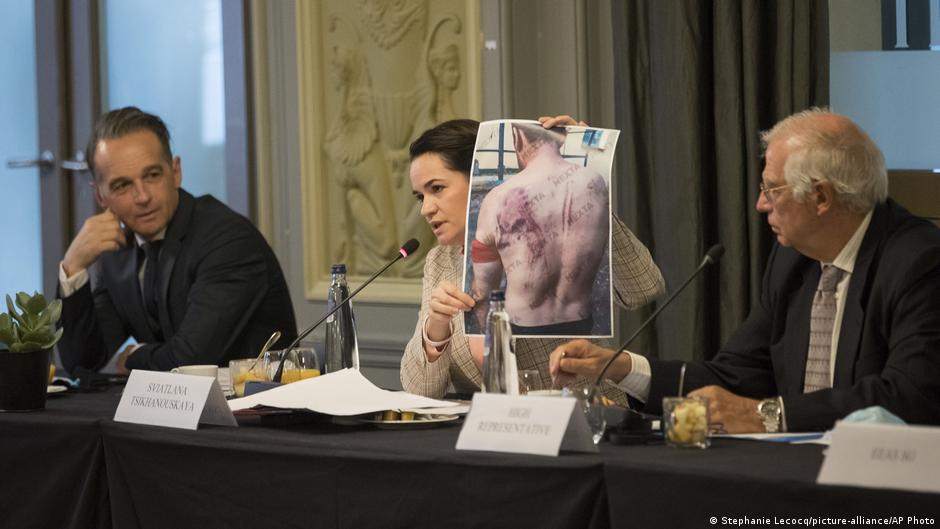Belarus opposition leader urges EU to be 'brave' on sanctions

EU foreign ministers are deciding on whether to impose sanctions on officials in Belarus. Main opposition leader Sviatlana Tsikanouskaya earlier called for a brave response to the crackdown that followed a disputed vote.
EU Foreign ministers met in Brussels on Monday to discuss possible sanctions against some 40 Belarusian officials, including President Alexander Lukashenko.
The measures are being considered in response to the election that saw Lukashenko elected to a sixth term in office, and the Minsk government's tough response to protesters who dispute the result.
German Foreign Minister Heiko Maas, whose country holds the European Union's rotating presidency, said a key issue was whether to include the president in sanctions.
Ministers must "ask ourselves the question of whether Mr. Lukashenko, the main one who bears responsibility, mustn't also be sanctioned by the European Union," said Maas.
Read more: Belarus police detain hundreds at women's rally against Lukashenko's rule
Countries including Croatia, Lithuania and Romania are calling for the full suite of measures to be deployed.
Lithuanian Foreign Minister Linas Linkevicius urged his colleagues to act decisively. "It's really time to act," he said. "It's the least we can do."
What the Belarus opposition said
The ministers spoke after meeting Lukashenhko's main opponent Sviatlana Tsikanouskaya, who called for a courageous response.
Speaking to reporters after meeting the ministers at breakfast, Tsikhanouskaya urged Europe to cut any financial support to the Belarus government.
"We did a lot to manage with this situation by ourselves, with only the strength of the Belarusian people, but now I understand that we need exterior help," she said, speaking in English.
Tsikhanouskaya said she understood that some ministers were reluctant, but that financial help would "only go for violence, for killing Belarusian people."
"At this meeting, I asked just to be more brave," she said.
What is the situation in Belarus?
The August election result showed Tsikanouskaya winning only about 10% of the vote, with Lukashenko — who has been in power for the past 26 years — garnering about 80%. Several people have died in protests since the vote.
Read more: Maria Kolesnikova: Belarusian musician, Lukashenko opponent
Tsikanouskaya was forced to flee Belarus for her own safety after the election.
EU foreign policy chief Josep Borrell said ministers would also consider what support the bloc could provide for the Belarusian people. He also said relations with Minsk might need to be reconsidered given that "we don't recognize Lukashenko as the legitimate president of Belarus."
He rejected allegations that the European Union was interfering. "This cannot be regarded as interference in internal affairs because democracy and human rights are at the core of the identity of the European Union."
tinyurlis.gdclck.ruulvis.netshrtco.de
